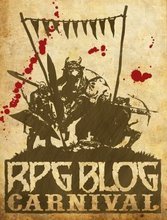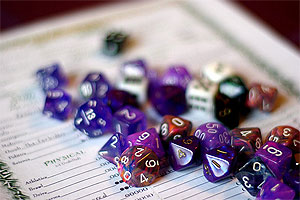Said while making snacks for the group …
Dave [player]: Hey, can I have experience points for baking cookies?
GM: Sure, Dave can have 200 experience points; Billee [his character] can’t.
[12 Aug 2009 Note: There’s an updated version of this post at Player contributions, Take Two.]
I first ran across the idea of player/character contributions when I started running the Amber Diceless RPG. The idea is simple: you get more points to build your character if you agree to do something helpful for the GM every game session. The exact details are left up to the GM and player to work out. I tried it as written in the rules, but soon met a major snag — getting players to follow through. Usually, I’d get enthusiastic contributions for 3-4 game sessions, then nothing. I tried giving giving out “luck” penalties — i.e. the player’s character would have strokes of bad luck for that game session — to those who didn’t live up to their agreement, but that seemed too punitive. Especially since most “non-contributors” just found they simply didn’t have time to keep up with it. Real Life™ would intrude.
Finally, I came upon an idea that worked. I honestly don’t remember if someone else gave me the idea or if I thought of it on my own. Instead of giving extra character creation points at the outset, I would hand out a small amount of experience points each game session I received a contribution. That way, no one would have to feel guilty if their child got the flu the previous week or if term papers were due, etc. Also, if a player who normally didn’t turn in anything got a sudden burst of inspiration, she could make a single contribution, without having to take on a long-term commitment she wouldn’t be able to keep up.
What kinds of things make good character contributions? Most of my games are very character-driven. Character backgrounds really do matter and will have an effect on the game as a whole. So the more I know about someone’s character, the better I can include them in the game. I generally hand out an optional character questionnaire to each player at the beginning of a new campaign. Filling that out and returning it to me is a favorite contribution for my players. Character portraits also count and, yes, I do accept references to book covers or movies as character portraits, as well as written descriptions; I don’t think this contribution should be limited to just those who can draw. As far as character journals go, each player can specify if his journal exists in-game (where another character may be able to find and read it) or out of it (just between the player and the GM).
Character journals and game session notes are definitely my favorite contributions to receive. I run “off the cuff”; frequently, my game notes for a particular session are a list of NPC names and possible locations. I make up most of the details during the game session and I find that if I stop to take notes, I lose the flow of the game. So having someone else in the group writing this stuff down for me is a huge help. That way, I don’t run into a problem of Bill But-You-Said-Last-Week-His-Name-Is-Fred, the baker.
I’ve also given out experience points for writing in-game newspaper articles, making topographical maps of an area or architectural drawings of important buildings, mapping genealogies of a country’s royal family, creating game “props” (such as a treasure map), … even writing an in-game academic dissertation complete with fictional bibliography and proper footnotes, penned by one of the PCs.
Basically, I’ll give out small amounts of experience for anything that is pertinent to the game and helps decrease my workload. How small? In Amber, World of Darkness, etc. games, I hand out one experience point per game session. On rare occasion, I might give out two for something that the player worked really hard at (see the academic dissertation above). For a AD&D game, I usually award 100 – 200 experience points, depending on how useful and detailed the contribution is. But in all cases, I have one overarching rule — a character can only get experience for one contribution each game session.
Of course, I’m the final arbitrator about what constitutes an helpful contribution and how much experience a PC gets.
 Now that I’ve gotten my adventure creation book out, I’m starting to look into the next project. One way I do that is to look back over my blog and see which posts are the most popular. One that seems to get a lot of hits is my Handling Problem Players post. Every GM has had at least one player that’s made her GMing life difficult.
Now that I’ve gotten my adventure creation book out, I’m starting to look into the next project. One way I do that is to look back over my blog and see which posts are the most popular. One that seems to get a lot of hits is my Handling Problem Players post. Every GM has had at least one player that’s made her GMing life difficult.




![Reblog this post [with Zemanta]](http://img.zemanta.com/reblog_c.png?x-id=cd2b278a-7304-4b9a-acd8-18cdb5fb1a84)





